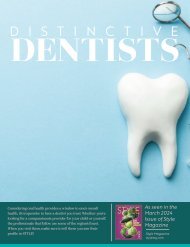Style Magazine June 2024
Create successful ePaper yourself
Turn your PDF publications into a flip-book with our unique Google optimized e-Paper software.
can range from just getting out of the<br />
house, going to the store and interacting<br />
with the cashier once a day, to going<br />
for a walk with a friend, joining a book<br />
club, or taking up a new hobby with a<br />
group of people.<br />
Being sociable boosts your mood<br />
and can help avoid or alleviate<br />
symptoms of depression. Social contact<br />
is a recognized factor in good brain<br />
health and good mental health—it will<br />
come as no surprise to know that brain<br />
health and mental health are cozy<br />
bedfellows.<br />
Donut and apple photo © SB Arts Media - stock.adobe.com. Woman playing game photo © Ang Geck Geck - stock.adobe.com.<br />
SLEEP IS ESSENTIAL<br />
And speaking of bed, sleep is essential<br />
to keep the brain sharp. Cheung<br />
recommends aiming for 7-9 hours<br />
of quality sleep each night. “Sleep<br />
deprivation can impair cognitive<br />
function, including memory, attention,<br />
and decision-making.”<br />
Just as parents create a bedtime<br />
routine with children, you should<br />
create one for yourself. It might include<br />
a no-screen rule after a certain time,<br />
using essential oils, and/or reading.<br />
Routine is key, as it trains the brain for<br />
sleep.<br />
STOP SMOKING<br />
Smoking is bad for your health in<br />
every way and linked to dementia. The<br />
benefits start as soon as you stop no<br />
matter what age, so never think that it’s<br />
too late!<br />
Secondary smoke can impact<br />
other people, and we now know that it<br />
cannot only lead to poor lung health<br />
but compromised brain health, too. Air<br />
pollution, in general, is a factor toward<br />
poor brain health, so try to find fresh<br />
air as much as possible; and, yes, go for<br />
that hike!<br />
BACK OFF ON THE<br />
BOOZE<br />
It’s well known that alcohol can<br />
interrupt sleep patterns and quality of<br />
sleep, as well as impairing the brain and<br />
how it functions. Many reports on brain<br />
health focus on the damage of excessive<br />
alcohol consumption, so really look at<br />
how much you’re drinking in a week.<br />
Cutting back will help you gain clarity,<br />
sleep more soundly, and improve other<br />
areas of your life listed here (being<br />
active, quitting smoking once and for<br />
all, and eating well). If you’re concerned<br />
and struggling to cut back, speak to a<br />
medical professional.<br />
MANAGE STRESS<br />
Poor sleep, excessive alcohol, and<br />
smoking are all stressors on the body;<br />
when you add in family life and work<br />
issues, mental stress can mount up.<br />
“Practicing mindfulness through<br />
meditation or yoga can help calm the<br />
mind and reduce anxiety. Engaging in<br />
behavioral health interventions like<br />
cognitive-behavioral therapy can equip<br />
individuals with coping mechanisms<br />
to manage stress effectively. By<br />
implementing these strategies,<br />
individuals can promote a healthier and<br />
more resilient brain,” explains Cheung.<br />
KEEP USING YOUR<br />
BRAIN<br />
Social interaction is great for using your<br />
brain, but so is putting it to work. In<br />
some reports, the longer people work<br />
into old age, the better off their brain<br />
is. If the 9-5 is no longer an option, try<br />
tackling that harder Sudoku or more<br />
cryptic crossword, or even studying for<br />
a qualification in something that piques<br />
your interest.<br />
EAT A HEALTHY DIET<br />
Diet always comes up, doesn’t it,<br />
but that’s because it matters. It’s<br />
important for so many bodily<br />
functions—and your brain. Small<br />
changes can make a big difference<br />
toward blood-sugar levels and weight<br />
management, which in turn will lead<br />
to a healthier body and mind.<br />
• Could you increase your fruit<br />
and veggie intake?<br />
• How much sugar are you<br />
consuming? Diabetes is a risk<br />
factor for poor brain health.<br />
• When it comes to protein, are<br />
you “eating lean?”<br />
“A Mediterranean-style diet has<br />
been linked to improved brain<br />
health,” advises Cheung.<br />
BRUSH YOUR TEETH<br />
Brush your teeth, floss, go to the<br />
dentist—oral hygiene is more than<br />
just keeping your teeth sparkly white<br />
and without cavities. Bacteria from<br />
your mouth is known to be able to<br />
cross the blood/brain barrier and<br />
therefore impacts your brain health.<br />
So go make that appointment for a<br />
checkup!<br />
Many of these habits are linked,<br />
as is the case with so much of our<br />
health and well-being. Though<br />
small changes can have an impact,<br />
if possible, think of your whole<br />
self and consider a change to your<br />
lifestyle rather than just one aspect<br />
of your daily routine. It’s all just<br />
mind over matter.<br />
JUNE <strong>2024</strong> | stylemg.com 41
















